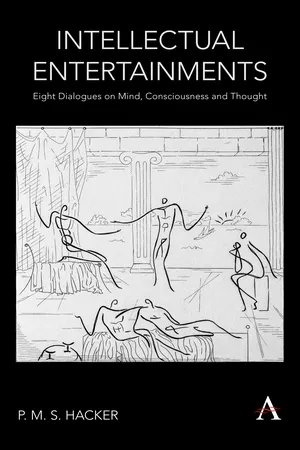
Intellectual Entertainments
Eight Dialogues on Mind, Consciousness and Thought
- 240 pages
- English
- ePUB (mobile friendly)
- Available on iOS & Android
About this book
Intellectual Entertainments' consists of eight philosophical dialogues, each with five participants, some living, some imaginary and some dead. The dialogues take place either in Elysium or in an imaginary Oxford Common Room. Each historical figure speaks in his own idiom with a distinctive turn of phrase. The imaginary figures speak in the accent and idiom of their respective countries (English, Scottish, American, Australian). The themes are the nature of the mind and the relation between mind and body; the nature of consciousness and its demystification; the nature of thought and its relation to speech; and the objectivity or subjectivity of perceptual qualities such as colour, sound, smell, taste and warmth. Each participant presents a different point of view and defends his position against the arguments of the others. No philosophical knowledge is presupposed.
Frequently asked questions
- Essential is ideal for learners and professionals who enjoy exploring a wide range of subjects. Access the Essential Library with 800,000+ trusted titles and best-sellers across business, personal growth, and the humanities. Includes unlimited reading time and Standard Read Aloud voice.
- Complete: Perfect for advanced learners and researchers needing full, unrestricted access. Unlock 1.4M+ books across hundreds of subjects, including academic and specialized titles. The Complete Plan also includes advanced features like Premium Read Aloud and Research Assistant.
Please note we cannot support devices running on iOS 13 and Android 7 or earlier. Learn more about using the app.
Information
Table of contents
- Cover
- Half Title
- Title Page
- Copyright Page
- Contents
- Preface
- Acknowledgements
- Section 1 Two Dialogues on Mind and Body
- Section 2 Two Dialogues on Consciousness
- Section 3 A Dialogue on the Objectivity or Subjectivity of Perceptual Qualities
- Section 4 Two Dialogues on Thought
- Section 5 A Dialogue on Ownership of Pain